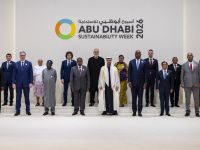At Carnegie Mellon, research and education are synonymous

When it comes to putting money in the stock market, it’s nice to know religious beliefs shouldn’t affect return on investment.
Research by Edmond Abi Saleh, a senior in business administration at Carnegie Mellon University in Qatar, compared growth patterns over time of Islamic and traditional finance. In a research project titled Islamic Finance Meets Wall Street, Abi Saleh found that the Dow Jones Islamic indexes, after accounting for initial volatility, noise cancellations and price corrections, showed no substantial differences in growth from the Dow Jones Industrial Average.
“For the same amount of risk, the investor gets the same amount of return. The added benefit, of course, is religious peace of mind,” Abi Saleh said of the Shari’ah-compliant market.
Abi Saleh’s research won him best poster and best undergraduate project at Carnegie Mellon’s sixth annual Meeting of the Minds undergraduate research symposium. He chose the topic because Islamic finance is rarely addressed in research.
“As I was undertaking my research, many of my professors were interested to learn of my findings. I think that sets the mark for valuable research research that can produce knowledge. As I move to becoming a graduate next week, I hope that I have left my mark on the university with my research and the next generation of students shows a greater interest in discovering more about Islamic finance,” Abi Saleh said.
Fellow senior, Raggi al Hammouri, a computer scientist and QF achiever, worked with the Williams Technology Centre on a project, titled “Developing Scenarios for a Qatar-specific Road Safety Simulator,” to develop specific, simulated training programs for learner drivers in Doha. Al Hammouri earned second place in the competition while computer science student Amna Zeyara’s project, Evaluation of the Ability of a Robot to Embody Different Cultural Traits, took third place.
“For our students, research is much more than a section of the course syllabus – it is at the foundation of a Carnegie Mellon education. Our faculty is working tirelessly to foster a lifetime of inquiry in our students that will benefit not only themselves, but also the country’s future development,” said Ilker Baybars, dean of Carnegie Mellon University in Qatar.
About 30 teams of undergraduate and post-graduate students presented their research projects at the annual symposium, which highlights some of the best ongoing student research at Carnegie Mellon University in Qatar. Research projects by students majoring in Business Administration, Computer Science and Information Systems were featured, along with projects completed by students taking Architecture classes at Carnegie Mellon Qatar this semester.
“Research is an all important part of the programs and coursework at both Carnegie Mellon in Pittsburgh and here in Qatar. Five of the projects being presented today are the result of our funded Summer Research Program that pairs student researchers with faculty mentors on a research project over a ten week period,” said John Robertson, assistant dean of academic affairs at Carnegie Mellon University in Qatar.
Post-graduate researchers also demonstrated the fruits of their work at Meeting of the Minds. Abderrahmen Mtibaa’s research, “Challenges in Mobile Opportunistic Network,” was awarded the best post-graduate project.
Each project was judged by a review committee consisting of experts from Qatar’s academic institutions and industry including representatives from the General Secretariat for Development Planning, Doha Bank, Qatar Shell Research & Technology Center, Qatar Shell GTL, Qatar University, Aspire Zone Foundation, Weill Cornell Medical College in Qatar, Texas A & M University at Qatar, ictQatar, Qatari Diar, deltaDOT, Qatar Computing Research Institute, Total Research Center Qatar, Vodafone Qatar, iHorizons and Al-Jazeera.
Background Information
Carnegie Mellon University Qatar
For more than a century, Carnegie Mellon University has challenged the curious and passionate to imagine and deliver work that matters. A private, top-ranked and global university, Carnegie Mellon sets its own course with programs that inspire creativity and collaboration.
In 2004, Carnegie Mellon and Qatar Foundation began a partnership to deliver select programs that will contribute to the long-term development of Qatar. Today, Carnegie Mellon Qatar offers undergraduate programs in biological sciences, business administration, computational biology, computer science, and information systems. Nearly 400 students from 38 countries call Carnegie Mellon Qatar home.







